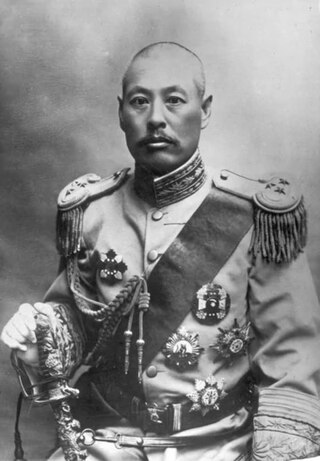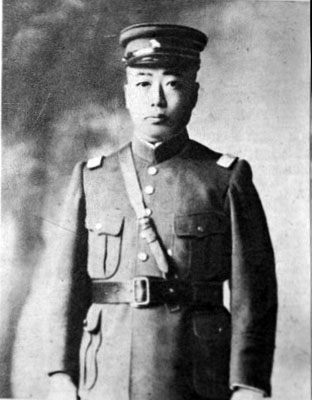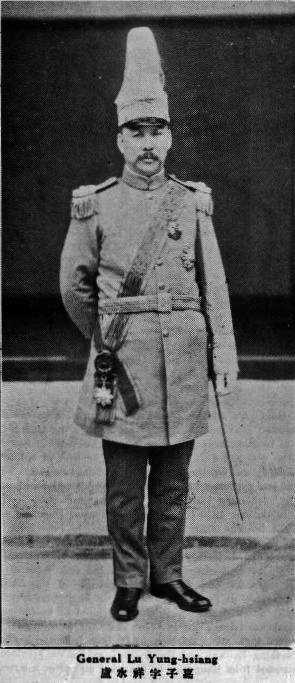Related Research Articles

Zhang Zuolin was a warlord who ruled Manchuria from 1916 to 1928. He led the Fengtian clique, one of the most important factions during China's Warlord Era. During the last year of his life, he briefly installed himself as President of the Republic of China.

The Beiyang Army, named after the Beiyang region, was a large, Western-style Imperial Chinese Army established by the Qing dynasty government in the late 19th century. It was the centerpiece of a general reconstruction of Qing China's military system. The Beiyang Army played a major role in Chinese politics for at least three decades and arguably right up to 1949. It made the Xinhai Revolution of 1911 possible, and, by dividing into warlord factions known as the Beiyang Clique, ushered in a period of regional division.
John King Fairbank was an American historian of China and United States–China relations. He taught at Harvard University from 1936 until his retirement in 1977. He is credited with building the field of China studies in the United States after World War II with his organizational ability, his mentorship of students, support of fellow scholars, and formulation of basic concepts to be tested.

Wu Peifu or Wu P'ei-fu was a major figure in the struggles between the warlords who dominated Republican China from 1916 to 1927.

The Warlord Era was a period in the history of the Republic of China when control of the country was divided among former military cliques of the Beiyang Army and other regional factions from 1916 to 1928.

The Beiyang government, officially the Republic of China, sometimes spelled Peiyang Government, or just China, was the government of the Republic of China which sat in its capital Beijing between 1912 and 1928. It was internationally recognized as the legitimate Chinese government during that time.

The Northeastern Army, also known as the Fengtian Army, was a Chinese army that existed from 1911 to 1937. It was created by General Zhang Zuolin and his "Fengtian Clique", who controlled Northeast China during China's Warlord Era. The Northeastern Army participated in many of the Warlord Era's conflicts and by the mid-1920s had become the dominant force in north China. However, the Kuomintang defeated the Northeastern Army and Zhang's allies during the Northern Expedition. In 1928, Zhang Zuolin was assassinated and succeeded by his son Zhang Xueliang. Xueliang pledged loyalty to the Kuomintang, bringing almost all of China under the same national government for the first time since 1917.

The Fengtian clique was the faction that supported warlord Zhang Zuolin during the Republic of China's Warlord Era. It took its name from Fengtian Province, which served as its original base of support, but quickly came to control all of the Three Northeastern Provinces. The clique received support from Japan in exchange for protecting Japanese military and economic interests in Manchuria. The Fengtian Army frequently intervened in many of the conflicts of the Warlord Era.

Zhang Jinghui ; was a Chinese general, warlord and politician during the Warlord era. He is noted for his role in the Japanese puppet regime of Manchukuo in which he served as its second and final Prime Minister.

The Huanggutun incident, also known as the Zhang Zuolin Explosion Death Incident, was the assassination of the Fengtian warlord and Generalissimo of the Military Government of China Zhang Zuolin near Shenyang on 4 June 1928.

The Northeast Flag Replacement refers to Zhang Xueliang's announcement on 29 December 1928 that all banners of the Beiyang government in Manchuria would be replaced with the flag of the Nationalist government, thus nominally uniting China under one government.

Yang Yuting was a Fengtian Army general and Military Governor (warlord) of Jiangsu during the early period of the Republic of China from August to November 1925. He was executed by Zhang Xueliang during a political power struggle.
The Communications Clique was a powerful interest group of politicians, bureaucrats, technocrats, businessmen, engineers, and labour unionists in China's Beiyang government (1912-1928). It is also known as the Cantonese Clique because many of its leaders hailed from Guangdong. They were named after the Ministry of Posts and Communications which was responsible for railways, postal delivery, shipping, and telephones as well as the Bank of Communications. This ministry earned five times more revenue for the government than all the other ministries combined.
Philip A. Kuhn was an American historian of China and the Francis Lee Higginson Professor of History and of East Asian Languages and Civilizations at Harvard University.

Lu Yongxiang (Chinese: 盧永祥; Chinese: 卢永祥; pinyin: Lú Yǒngxiáng; Wade–Giles: Lu2 Yung3-hsiang2; IPA: [lú i̯ʊ̌ŋɕi̯ɑ́ŋ] October 22, 1867 – May 15, 1933) was an Anhui clique warlord and military governor of Zhejiang, Zhili, and Jiangsu.
Benjamin Isadore Schwartz was an American academic, political scientist, and sinologist who wrote on a wide range of topics in Chinese politics and intellectual history.

The Fairbank Center for Chinese Studies at Harvard University is a post-graduate research center promoting the study of modern and contemporary China from a social science perspective. The center hosts and organizes academic activities, provides research funds for faculty and students, and helps policy-makers and news media to understand modern China. The center sponsors the Edwin O. Reischauer Lectures.
Roy Mark Hofheinz Jr. is an American academic, sinologist who was professor of Government at Harvard University. He is best-known for his work on the Chinese Communist Revolution.

Konstantin Petrovich Nechaev was an Imperial Russian Army officer and White movement leader, who commanded a large Russian mercenary army in China from 1924 to 1929. Fighting for the Fengtian clique warlords Zhang Zuolin and Zhang Zongchang, Nechaev took part in several wars of the Chinese Warlord Era until his mercenary force was destroyed in the Northern Expedition. Thereafter, he mostly retired from military service and became a White émigré community leader in Manchuria. Captured by SMERSH during the Soviet invasion of Manchuria, Nechaev was executed by Soviet authorities in 1946.

The National Pacification Army (NPA), also known as the Anguojun or Ankuochun, was a warlord coalition led by Fengtian clique General Zhang Zuolin, and was the military arm of the Beiyang government of the Republic of China during its existence.
References
- ↑ "About Ronald Suleski". Suffolk University, Boston. Retrieved 20 March 2017.
- ↑ "Collecting Research Materials in Shanghai: A Qing Dynasty Astrologer's Predictions for the Future". Royal Asiatic Society, Shanghai. Retrieved 20 March 2017.
- ↑ "Ronald Suleski". Harvard University. Retrieved 20 March 2017.
- ↑ "Ronald Suleski". Harvard University. Retrieved 20 March 2017.
- ↑ "The modernization of Manchuria : an annotated bibliography / Ronald Suleski". National Library of Australia. Retrieved 22 March 2017.
- ↑ "Civil Government in Warlord China: Tradition, Modernization and Manchuria by Ronald Suleski". The China Quarterly. Retrieved 20 March 2017.